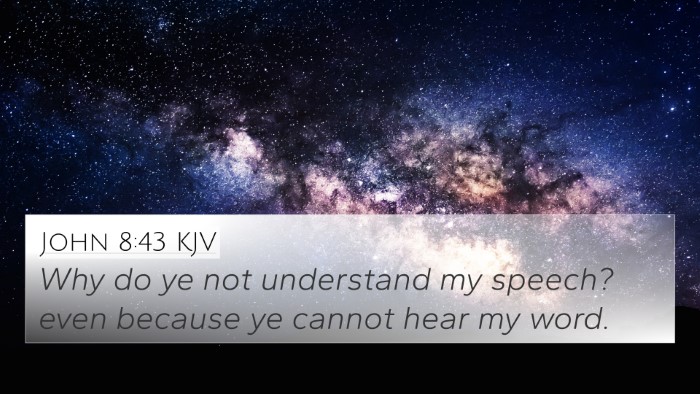Meaning and Interpretation of 1 Corinthians 2:14
Verse Text: "But the natural man does not receive the things of the Spirit of God, for they are foolishness to him; nor can he know them, because they are spiritually discerned." (1 Corinthians 2:14)
Summary of Insights from Commentaries
This verse highlights the fundamental divide between the natural human understanding and the spiritual truths imparted by God. Paul outlines a clear distinction between those who are spiritually attuned and those who are not. The insights drawn from Matthew Henry, Albert Barnes, and Adam Clarke help to clarify this verse’s meaning.
Understanding the Natural Man
Matthew Henry suggests that the "natural man" refers to those who rely solely on their human intellect and moral reasoning, devoid of spiritual insight. Such individuals cannot grasp the profound truths of the gospel, which, to them, appear as foolishness. This speaks to the need for spiritual awakening and illumination by the Holy Spirit to understand divine revelations.
Albert Barnes emphasizes that this inability to understand spiritual truths stems from a lack of spiritual life. The natural man may possess knowledge and intelligence but lacks the capability to understand God’s wisdom, which requires the intervention of the Holy Spirit.
Adam Clarke adds that the "natural man" is contrasted with the spiritual man who is able to discern and appreciate the things of God. Clarke points out that spiritual discernment is not merely an intellectual process but a heart understanding that opens one to the truths of Scripture.
Spiritual Discernment
Spiritual discernment is pivotal to understanding divine wisdom. As noted in various commentaries, it is through the Holy Spirit that believers are enabled to perceive and appreciate God’s revelations. This understanding transcends mere human reason and requires a transformation of the heart.
Cross References
This verse connects with several other biblical texts that elucidate the theme of understanding and spiritual discernment. Here are notable cross-references:
- John 14:17: "the Spirit of truth, whom the world cannot receive, because it neither sees Him nor knows Him." This verse emphasizes the reception of the Spirit and its relation to understanding God’s truth.
- Romans 8:7: "the carnal mind is enmity against God; for it is not subject to the law of God, nor indeed can be." This shows the natural mind’s rejection of spiritual law.
- 1 Corinthians 1:18: "For the message of the cross is foolishness to those who are perishing, but to us who are being saved it is the power of God." This verse reinforces the idea of divine knowledge being foolishness to the unspiritual.
- 2 Corinthians 4:4: "Whose minds the god of this age has blinded, who do not believe." This passage affirms that spiritual insight is hindered by external influences.
- Ephesians 4:18: "having their understanding darkened, being alienated from the life of God." This underlines the spiritual ignorance of those outside of God’s grace.
- 1 John 5:20: "And we know that the Son of God has come and has given us an understanding." This illustrates that true understanding comes through Christ.
- Colossians 2:3: "in whom are hidden all the treasures of wisdom and knowledge." This emphasizes the source of spiritual wisdom being found in Christ.
Connections and Themes
1 Corinthians 2:14 plays a crucial role in understanding the broader Pauline theology regarding the operation of the Holy Spirit in the life of believers. The connections between this verse and the surrounding passages within the epistle enrich the reader's grasp of spiritual matters.
Thematic Bible Verse Connections
Various themes emerge from the intertextual analysis of this verse:
- Spiritual Insight vs. Human Understanding: Highlighted throughout Pauline writings, emphasizing the role of the Spirit.
- The Role of the Holy Spirit: Central to the believer's understanding, acting as a guide and teacher.
- Foolishness of the Gospel: Present from early church teachings, suggesting a radical reorientation towards divine wisdom.
- Transformation of the Mind: A recurring theme, particularly in Romans 12:2, where renewal allows for discernment of God's will.
Comparative Bible Verse Analysis
In conducting a comparative study, one may examine how other New Testament writers address similar concepts. The parallels between James 1:5 ("If any of you lacks wisdom, let him ask of God") illustrate the necessity of seeking divine aid for understanding.
Conclusion
1 Corinthians 2:14 serves as a profound reminder of the innate spiritual blindness of humanity contrasted with the illuminating work of the Holy Spirit. Understanding this verse’s implications allows believers to appreciate the depth of God's wisdom and their dependence on the Spirit for spiritual discernment. The interconnectedness of this verse with others enhances its meaning and relevance in a comprehensive Bible study approach.


























